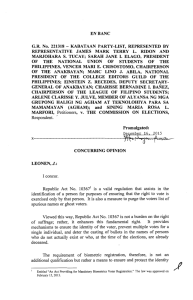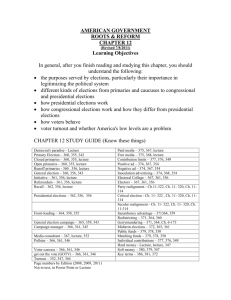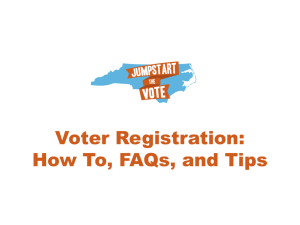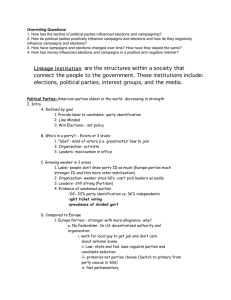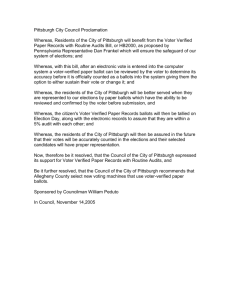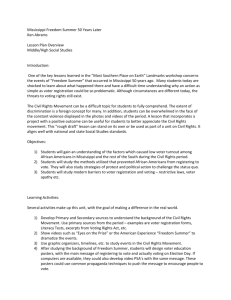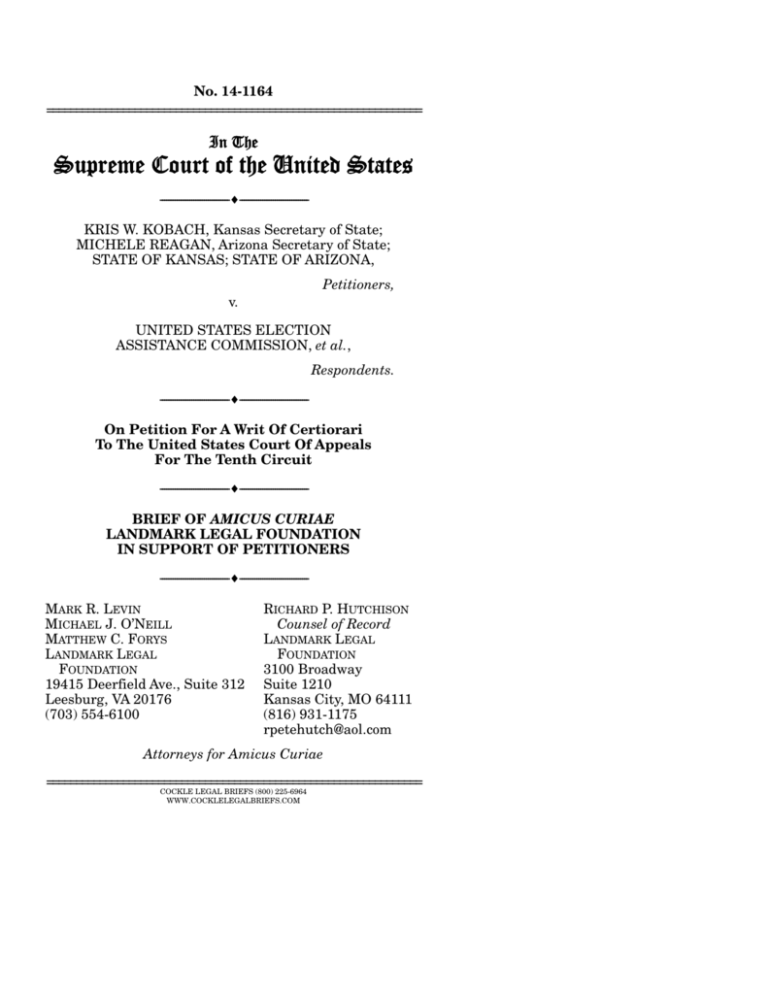
No. 14-1164
================================================================
In The
Supreme Court of the United States
-----------------------------------------------------------------KRIS W. KOBACH, Kansas Secretary of State;
MICHELE REAGAN, Arizona Secretary of State;
STATE OF KANSAS; STATE OF ARIZONA,
Petitioners,
v.
UNITED STATES ELECTION
ASSISTANCE COMMISSION, et al.,
Respondents.
-----------------------------------------------------------------On Petition For A Writ Of Certiorari
To The United States Court Of Appeals
For The Tenth Circuit
-----------------------------------------------------------------BRIEF OF AMICUS CURIAE
LANDMARK LEGAL FOUNDATION
IN SUPPORT OF PETITIONERS
-----------------------------------------------------------------MARK R. LEVIN
MICHAEL J. O’NEILL
MATTHEW C. FORYS
LANDMARK LEGAL
FOUNDATION
19415 Deerfield Ave., Suite 312
Leesburg, VA 20176
(703) 554-6100
RICHARD P. HUTCHISON
Counsel of Record
LANDMARK LEGAL
FOUNDATION
3100 Broadway
Suite 1210
Kansas City, MO 64111
(816) 931-1175
rpetehutch@aol.com
Attorneys for Amicus Curiae
================================================================
COCKLE LEGAL BRIEFS (800) 225-6964
WWW.COCKLELEGALBRIEFS.COM
i
TABLE OF CONTENTS
Page
TABLE OF AUTHORITIES .................................
ii
STATEMENT OF INTEREST OF AMICUS
CURIAE ............................................................
1
INTRODUCTION AND SUMMARY OF ARGUMENT ...............................................................
1
ARGUMENT ........................................................
4
I.
The Elections Clause Does Not Trump
the Voter Qualifications Clause, But
Must Operate in Harmony With State
Prerogatives ...............................................
4
II.
The States’ Interest in Protecting Ballot
Integrity Has Become More Compelling
in Light of Federal Executive Agency Actions That Will Grant Work Authorizations to Millions of Noncitizens ................. 14
III.
This Court Should Grant Certiorari to
Avoid Voter Confusion and Provide Clear
Guidance to States Conducting Elections
Before the Elections of 2016 ......................... 20
CONCLUSION..................................................... 22
ii
TABLE OF AUTHORITIES
Page
CASES:
Anderson v. United States, 417 U.S. 211 (1974) ........12
Arizona v. Inter Tribal Council of Arizona, Inc.,
133 S. Ct. 2247 (2013) ..................................... passim
Ex parte Siebold, 100 U.S. 371 (1880) ....................... 11
Lassiter v. Northampton County Bd. of Elections, 360 U.S. 45 (1959) ...........................................6
Mason v. Missouri, 179 U.S. 328 (1900) ......................6
Pope v. Williams, 193 U.S. 621 (1904) .........................5
Purcell v. Gonzalez, 549 U.S. 1 (2006) .......................21
Smiley v. Holm, 285 U.S. 355 (1932) ............... 5, 11, 12
State of Texas, et al. v. United States, et al., No.
1:14-cv-00254 (S.D. Tex. February 16, 2015) .........16
United States Term Limits v. Thornton, 514
U.S. 779 (1995) .................................................... 8, 11
Wesberry v. Sanders, 376 U.S. 1 (1964) .....................13
CONSTITUTION AND STATUTES:
U.S. Const. Article I, Section 2, cl. 1 ........................1, 5
U.S. Const. Article I, Section 4, cl. 1 ......................4, 13
U.S. Const. Amendment XV .........................................6
U.S. Const. Amendment XVII ..................................5, 6
U.S. Const. Amendment XIX .......................................6
U.S. Const. Amendment XXIV .....................................6
iii
TABLE OF AUTHORITIES – Continued
Page
U.S. Const. Amendment XXVI .....................................6
8 U.S.C. § 1324a et seq. ................................................9
The National Voter Registration Act, 42 U.S.C.
§§ 1973gg et seq., reclassified as 52 U.S.C.
§ 20501 et seq....................................... 2, 3, 12, 21, 22
Arizona’s Proposition 200 ...........................................14
MISCELLANEOUS:
3 J. Elliot’s Debates on the Federal Constitution 367 (1876) .................................................. 11, 13
8 C.F.R. § 274a.2 ...........................................................9
8 C.F.R. § 274a.2(b)(v)(B)(1)(iii) .................................10
Bazelon Center for Mental Health Law &
National Disability Rights Network, A Guide
to the Voting Rights of People with Mental
Disabilities (2008) .....................................................7
Cindy Carcamo, “Rumors of U.S. haven for
families spur rise in illegal immigration,” Los
Angeles Times, June 6, 2014 ...................................15
Stephen Dinan, “Obama amnesty creates
loophole for illegal immigrants to vote in
elections,” The Washington Times, Feb. 12,
2015 .........................................................................17
Stephen Dinan, “Obama amnesty granted
500,000 Social Security numbers to illegal
immigrants,” The Washington Times, April
15, 2015 .............................................................18, 19
iv
TABLE OF AUTHORITIES – Continued
Page
John Fund and Hans von Spakovsky, Who’s
Counting: How Fraudsters and Bureaucrats
Put Your Vote At Risk (New York: 2012) ...................9
Joel Gehrke, “DHS Blames Border Surge on
DACA Confusion in Spanish Language oped,” National Review, August 8, 2014 ...................15
Elizabeth Harrington, “Feds Have Issued
541,000 to Illegal Aliens,” The Washington
Free Beacon, April 16, 2015 ....................................19
Letter from Acting Commissioner Carolyn W.
Colvin, Social Security Administration (April
10, 2015) ..................................................................19
Memorandum from Secretary Janet Napolitano
on DACA (June 15, 2012)........................................15
Memorandum from Secretary Jeh Charles
Johnson on DAPA (November 20, 2014) ................16
Michael D. Shear, “Appeals Panel Weighs
Obama Immigration Actions,” The New York
Times, April 18, 2015 ..............................................20
Joseph Story, A Familiar Exposition of The
Constitution of the United States, Regnery
Publishing (1986) ......................................................7
The Federalist No. 52 ...................................................5
v
TABLE OF AUTHORITIES – Continued
Page
Testimony of Kris W. Kobach, “The President’s
Executive Actions on Immigration and Their
Impact on Federal and State Elections,”
House Subcommittees on National Security
and Health Care, Benefits & Administrative
Rules, February 12, 2015........................................18
Hans A. von Spakovsky and Roger Clegg,
“Felon Voting and Unconstitutional Congressional Overreach,” The Heritage Foundation,
February 11, 2015 .....................................................7
Reid Wilson, “As the 2016 political slates
solidifies, the primary calendar remains in
flux,” The Washington Post, March 16, 2015 .........21
1
STATEMENT OF INTEREST
1
OF AMICUS CURIAE
Amicus curiae Landmark Legal Foundation is a
national public interest law firm committed to preserving the principles of limited government, separation of powers, federalism, advancing an originalist
approach to the Constitution and defending individual rights and responsibilities. Specializing in Constitutional history and litigation, Landmark presents
herein a unique perspective concerning the legal
issues and national implications of the Tenth Circuit’s
improper interpretation of the states’ power to set
qualifications for electors under U.S. Const. art. I,
sec. 2, cl. 1.
------------------------------------------------------------------
INTRODUCTION AND
SUMMARY OF ARGUMENT
This case concerns the balance between Congress
and the States under the Elections and Voter Qualifications Clauses and whether that balance was
properly determined by the executive director of a
1
The parties have consented to the filing of this brief. No
counsel for a party authored this brief in whole or in part, and
no counsel or party made a monetary contribution intended to
fund the preparation or submission of this brief. No person other
than amicus curiae, its members, or its counsel made a monetary contribution to its preparation or submission. The parties
were notified ten days prior to the due date of this brief of the
intention to file.
2
federal agency functioning without a quorum. In
Arizona v. Inter Tribal Council of Arizona, Inc., 133
S. Ct. 2247 (2013) (“ITCA”) this Court held that
language in the National Voter Registration Act
(“NVRA”), 52 U.S.C. § 20501 et seq.,2 directing States
to “accept and use” a Federal Form for voter registration precluded Arizona from requiring additional
proof of citizenship. Id. at 2260.
This Court carefully read the NVRA to avoid a
conflict with the States’ constitutional power under
the Voter Qualifications Clause. Section 20508(b)(1)
provided that the Federal Form “may require” only
such additional information “as is necessary to enable
the appropriate State election official to assess the
eligibility of the applicant. . . .”3 This Court acknowledged that “it would raise serious constitutional
doubts if a federal statute precluded a State from
2
The NVRA, formerly 42 U.S.C. § 1973gg et seq., was
reclassified to 52 U.S.C. § 20501 et seq.
3
The statute provides:
Contents of mail voter registration form. The mail
voter registration form developed under subsection
(a)(2) –
(1) may require only such identifying information (including the signature of the applicant) and other information (including data relating to previous
registration by the applicant), as is necessary to enable the appropriate State election official to assess the
eligibility of the applicant and to administer voter registration and other parts of the election process. . . .
52 U.S.C. § 20508(b)(1).
3
obtaining the information necessary to enforce its
voter qualifications.” ITCA, 133 S. Ct. at 2258-59.
This Court thus stated that “it is surely permissible if
not requisite for the Government to say that necessary
information which may be required will be required.”
Id. at 2259 (emphasis in original). This Court even
highlighted how the NVRA provides “another means
by which Arizona may obtain information needed for
enforcement”: a request to the EAC to alter the
Federal Form and if denied, a challenge of that denial
under the Administrative Procedure Act. Id.
Arizona (and Kansas) followed the roadmap
provided by this Court to seek federal cooperation
from the EAC to ensure that only qualified citizens
were registered to vote in their states. The states
requested anew that the U.S. Election Assistance
Commission (“EAC”) include proof of citizenship
requirements on the Federal Form’s state-specific
instructions. The EAC rejected the States’ requests,
because the modifications were not “necessary.” The
reviewing district court ordered the EAC to implement the changes immediately, but the Tenth Circuit
reversed the decision of the district court, thereby
establishing that the EAC’s discretionary power
trumps the States’ constitutional prerogative to
enforce the qualifications of their voters.
The constitutional conflict this Court attempted
to avoid in ITCA has thus resurfaced. This Court
should grant certiorari because the Tenth Circuit’s
decision distorts the separation of powers between
the Federal government and the States. The States’
4
ability to prevent or correct noncitizen voter registration has been materially impaired by the Tenth
Circuit’s decision as well as by recent actions of the
Executive Branch and must be restored well in advance of the 2016 elections.
------------------------------------------------------------------
ARGUMENT
I.
The Elections Clause Does Not Trump the
Voter Qualifications Clause, But Must Operate in Harmony With State Prerogatives.
This case revisits the tension inherent between
the Constitution’s Voter Qualifications Clause and the
Elections Clause. “[T]he Elections Clause empowers
Congress to regulate how federal elections are held,
but not who may vote in them.” ITCA, 133 S. Ct. at
2257. The Elections Clause states, “The Times, Places
and Manner of holding Elections for Senators and
Representatives, shall be prescribed in each State by
the Legislature thereof; but the Congress may at any
time by Law make or alter such Regulations, except
as to the Places of chusing Senators.” U.S. Const. art.
I, sec. 4. This power to regulate how elections are
held is broad. As Chief Justice Hughes wrote:
It cannot be doubted that these comprehensive words embrace authority to provide a
complete code for congressional elections, not
only as to times and places, but in relation to
notices, registration, supervision of voting,
protection of voters, prevention of fraud and
5
corrupt practices, counting of votes, duties of
inspectors and canvassers, and making and
publication of election returns; in short, to
enact the numerous requirements as to procedure and safeguards which experience shows
are necessary in order to enforce the fundamental right involved.
Smiley v. Holm, 285 U.S. 355, 366 (1932) (emphasis
added).
However, the Framers established that the
States, and not Congress, set voter qualifications for
congressional elections. Qualifications for voters in
federal legislative elections correspond to those for
voters in the “most numerous Branch of the State
Legislature.” U.S. Const. art. I, sec. 2, cl. 1. (The
Seventeenth Amendment provides the same framework for senatorial elections.) As James Madison
wrote in Federalist No. 52,
The definition of the right of suffrage is very
justly regarded as a fundamental article of
republican government. It was incumbent on
the convention, therefore, to define and establish this right in the Constitution. To
have left it open for the occasional regulation
of the Congress, would have been improper
for the reason just mentioned.
The Federalist No. 52, at 326 (J. Madison) (C.
Rossiter ed. 1961). The Voter Qualifications Clause
clearly establishes the states’ authority to regulate
who may vote in elections. As Justice Douglas wrote,
“The States have long been held to have broad powers
6
to determine the conditions under which the right of
suffrage may be exercised, Pope v. Williams, 193 U.S.
621, 633; Mason v. Missouri, 179 U.S. 328, 335,
absent of course the discrimination which the Constitution condemns.” Lassiter v. Northampton County
Bd. of Elections, 360 U.S. 45, 50-51 (1959) (superseded by statute).
The regulation of voting in the United States has
become more uniform through the passage of
Amendments to the Constitution: Fifteenth, Seventeenth, Nineteenth, Twenty-Fourth and Twenty-Sixth.
The original framework at the nation’s founding,
however, displays deference to the States in the
determination of voter qualifications. As Justice
Joseph Story wrote,
[The qualifications of electors] were various
in the different States. In some of them, none
but freeholders were entitled to vote; in others, only persons, who had been admitted to
the privileges of freemen; in others, a qualification of property was required of voters; in
others, the payment of taxes; and in others,
again, the right of suffrage was almost universal. This consideration had great weight
in the Convention; and the extreme difficulty
of agreeing upon any uniform rule of voting,
which should be acceptable to all the States,
induced the Convention, finally, after much
discussion, to adopt the existing rule in the
choice of Representatives in the popular
branch of the State legislatures. Thus, the
peculiar wishes of each State, in the
7
formation of its own popular branch, were
consulted; and some not unimportant diversities were introduced into the actual
composition of the national House of Representatives. All the members would represent
the people, but not exactly under influences
precisely of the same character.
Joseph Story, A Familiar Exposition of The Constitution of the United States, § 69, 74-75, Regnery Publishing (1986). This framework remains intact since
Justice Story’s Commentary. Although as a Nation we
have expanded the franchise to former slaves, women, and 18 year olds by Constitutional Amendment,
the States still have diversity of opinion over voter
qualifications, such as the voting rights of felons or
the mentally incompetent. See Hans A. von
Spakovsky and Roger Clegg, “Felon Voting and Unconstitutional Congressional Overreach,” The Heritage Foundation, February 11, 2015, http://www.
heritage.org/research/reports/2015/02/felon-voting-andunconstitutional-congressional-overreach; Bazelon
Center for Mental Health Law & National Disability
Rights Network, A Guide to the Voting Rights of
People with Mental Disabilities 41-66 (2008).
A State’s power to establish qualifications, according to its peculiar and diverse wishes, must
include a power to enforce them. As this Court stated,
“Since the power to establish voting requirements is
of little value without the power to enforce those
requirements, . . . it would raise serious constitutional doubts if a federal statute precluded a State from
8
obtaining the information necessary to enforce its
voter qualifications. ITCA, 133 S. Ct. at 2258-59.
In this case, the Tenth Circuit’s decision allows
Congress, through indirect means, to restrict Kansas
and Arizona’s authority to determine their Voter
Qualifications. The Federal Form requires prospective
voters only to check a box to signify their eligibility to
vote as U.S. citizens and sign under penalty of perjury. 52 U.S.C. § 21083(b)(4)(A)(i); 52 U.S.C. §§ 20504,
20505, 20508(b). No other proof of U.S. citizenship is
required by the form for registration by mail, which,
as Arizona and Kansas determined and sought to
remedy, makes it susceptible to fraud. In United
States Term Limits v. Thornton, 514 U.S. 779, 829
(1995), this Court held that Arkansas’s restriction on
qualifications for service in Congress was “an indirect
attempt to accomplish what the Constitution prohibits Arkansas from accomplishing directly.” Justice
Stevens noted that “ ‘constitutional rights would be of
little value if they could be . . . indirectly denied.’ . . .
The Constitution ‘nullifies sophisticated as well as
simple-minded modes’ of infringing on constitutional
protections.” (internal citations omitted) Id.
This violation of the Voter Qualifications Clause,
if left standing, would upset the delicate balance of
the federalist system. As Justice Kennedy wrote in
his concurring opinion in U.S. Term Limits v.
Thornton, “That the States may not invade the
sphere of federal sovereignty is as incontestable, in
my view, as the corollary proposition that the Federal
Government must be held within the boundaries of
9
its own power when it intrudes upon matters reserved to the States.” Id. at 841.
The lax standards of proof of citizenship on the
Federal Form, in conjunction with Arizona’s unique
situation as a border state, a main gateway for illegal
immigration, and a state with one of the highest
percentages of illegal immigrants among its total
population, undermine Arizona’s constitutional
prerogative to set the qualifications for its voters.
Indeed, although all states have some presence of
illegal immigrants, the illegal immigrant population
is unevenly distributed throughout the country. It
stands to reason states with large illegal immigration
populations would need to take precautionary
measures to guarantee the integrity of the vote.
It should also be noted that illegal immigrants
may sometimes seek voter registration without
concern for voting. A voter registration card can be
used to help an individual establish his identity,
which is necessary when obtaining a driver’s license
or proving authorization to work in the U.S. John
Fund and Hans von Spakovsky, Who’s Counting: How
Fraudsters and Bureaucrats Put Your Vote At Risk
(New York: 2012) 90. Pursuant to the Immigration
Reform and Control Act (IRCA), 8 U.S.C. § 1324a et
seq. and accompanying regulations, 8 C.F.R. § 274a.2,
prospective employees must establish their identities
and ability to work in the U.S. by filling out a Form
I-9, Employment Eligibility Verification, provided by
the U.S. Citizenship and Immigrations Services.
(Available at http://www.uscis.gov/sites/default/files/
10
files/form/i-9.pdf.) Among the form’s “Lists Of Acceptable Documents” used to establish identity is a
voter’s registration card. Id. at 9; 8 C.F.R.
§ 274a.2(b)(v)(B)(1)(iii). Thus, the laxity of the Federal Form’s required proof of citizenship along with the
need to seek work authorizations provides aliens with
the means, motive and opportunity for fraudulent
voter registration.
The notion that the states are mere bystanders in
the conduct of elections is incompatible with the ratification debates and this Court’s decisions. As James
Madison stated at Virginia’s ratifying convention,
It was found impossible to fix the time, place,
and manner, of the election of representatives, in the Constitution. It was found necessary to leave the regulation of these, in the
first place, to the state governments, as being
best acquainted with the situation of the people, subject to the control of the general government, in order to enable it to produce
uniformity, and prevent its own dissolution.
And, considering the state governments and
general government as distinct bodies, acting
in different and independent capacities for
the people, it was thought the particular
regulations should be submitted to the former, and the general regulations to the latter. Were they exclusively under the control
of the state governments, the general government might easily be dissolved. But if
they be regulated properly by the state legislatures, the congressional control will very
probably never be exercised.
11
3 J. Elliot’s Debates on the Federal Constitution 367
(1876) (emphasis added). Furthermore, as Justice
Kennedy observed in United States Term Limits v.
Thornton, the states are not completely without
power in the conduct of elections. He wrote:
[B]ecause the Framers recognized that state
power and identity were essential parts of
the federal balance, see The Federalist No.
39, the Constitution is solicitous of the prerogatives of the States, even in an otherwise
sovereign federal province. The Constitution
. . . grants States certain powers over the
times, places, and manner of federal elections
(subject to congressional revision), Art. I, § 4,
cl. 1.
United States Term Limits v. Thornton, 514 U.S. 779,
841-42 (1995) (Kennedy, J., concurring) (emphasis
added).
Furthermore, this Court’s opinions show that
while congressional power is paramount, the federal
regulation preempts state statutes only as far as they
conflict. “The regulations made by Congress are
paramount to those made by the State legislature;
and if they conflict therewith, the latter, so far as the
conflict extends, ceases to be operative.” Ex parte
Siebold, 100 U.S. 371, 384 (1880). It must also be
noted that congressional power to regulate elections
under the Election Clause is not for mere convenience
but is intended to safeguard rights.
Returning to Justice Hughes’s discussion in
Smiley, supra, Congress has the power to impose “the
12
numerous requirements as to procedure and safeguards which experience shows are necessary in
order to enforce the fundamental right involved.”
Smiley v. Holm, 285 U.S. 355, 366 (1932). In this
case, the fundamental rights of many different parties have been implicated.
Congress sought to promote the voting rights of
prospective registrants through the NVRA. However,
not only do Arizona and the other states have a right
to determine their voter qualifications, but the individual voters of Arizona themselves have the right to
have their votes counted without being diluted by
unqualified voters. “Every voter in a federal primary
election, whether he votes for a candidate with little
chance of winning or for one with little chance of
losing, has a right under the Constitution to have his
vote fairly counted, without its being distorted by
fraudulently cast votes.” Anderson v. United States,
417 U.S. 211, 227 (1974).
An underlying purpose of the Election Clause, it
must be emphasized, is to protect the people’s right of
suffrage. Its wide scope provides the ability “to enact
the numerous requirements as to procedure and
safeguards which experience shows are necessary in
order to enforce the fundamental right involved.”
Smiley v. Holm, 285 U.S. 355, 366 (1932) (emphasis
added).
At the Virginia ratifying convention, James
Monroe asked Madison to explain why the Framers
gave general power over congressional elections to
13
the national government. Madison responded that the
national government needed a remedy to correct disproportionate representation within a state, suggesting
an attempt to prevent the imitation of Britain’s
“rotten boroughs” where electoral districts with tiny
populations diluted the power of larger districts. He
said:
[I]t was thought that the regulation of time,
place, and manner, of electing the representatives should be uniform throughout the continent. Some States might regulate the
elections on the principles of equality, and
others might regulate them otherwise. This
diversity would be obviously unjust. Elections are regulated now unequally in some
states, particularly South Carolina, with respect to Charleston, which is represented by
thirty members. Should the people of any
state by any means be deprived of the right of
suffrage, it was judged proper that it should
be remedied by the general government.
3 J. Elliot’s Debates on the Federal Constitution 367
(1876) (emphasis added). Other state ratifying conventions discussing the issue stressed “that the
House of Representatives was meant to be free of the
malapportionment then existing in some of the state
legislatures . . . and argued that the power given
Congress in Art. I, § 4, was meant to be used to
vindicate the people’s right to equality of representation in the House.” Wesberry v. Sanders, 376 U.S. 1,
16 (1964) (internal citations omitted). In other words,
the framers were concerned with the potential for
14
improper dilution of the vote. This Court should grant
certiorari to ensure the States maintain the power to
prevent the dilution of the vote by noncitizens.
II.
The States’ Interest in Protecting Ballot
Integrity Has Become More Compelling in
Light of Federal Executive Agency Actions That Will Grant Work Authorizations to Millions of Noncitizens.
The original dispute over the content of the
Federal Form was prompted by the large presence of
illegal immigrants in Arizona and lax standards in
the issuance of identity cards.4 Ariz. Proposition 200
§ 2 (2004), http://apps.azsos.gov/election/2004/Info/Pub
Pamphlet/english/prop200.pdf. These issues have not
4
Proposition 200 stated within its “Findings and declaration”:
This state finds that illegal immigration is causing
economic hardship to this state and that illegal immigration is encouraged by public agencies within this
state that provide public benefits without verifying
immigration status. This state further finds that illegal immigrants have been given a safe haven in this
state with the aid of identification cards that are issued without verifying immigration status, and that
this conduct contradicts federal immigration policy,
undermines the security of our borders and demeans
the value of citizenship. Therefore, the people of this
state declare that the public interest of this state requires all public agencies within this state to cooperate with federal immigration authorities to discourage
illegal immigration.
15
been resolved. Instead, they have been exacerbated
by a recent surge of border crossing as well as actions
taken by the federal government over the past several
years. As a result, Kansas and Arizona’s interest in
verifying citizenship during voter registration has
become more compelling since this Court’s opinion in
ITCA.
In June 2014, news reports indicated that there
was an “unprecedented surge of families crossing
illegally into the U.S., drawn by reports circulating
throughout Central America that parents with children are allowed to stay in the United States indefinitely, according to Guatemalan consular officials and
parents who are making these trips.” Cindy Carcamo,
“Rumors of U.S. haven for families spur rise in illegal
immigration,” Los Angeles Times, June 6, 2014, p. A1.
These illegal immigrants may have been prompted in
part by the Obama Administration’s Deferred Action
for Childhood Arrivals program (“DACA”). Joel
Gehrke, “DHS Blames Border Surge on DACA Confusion in Spanish Language op-ed,” National Review,
August 8, 2014, http://www.nationalreview.com/corner/
385060/dhs-blames-border-surge-daca-confusion-spanishlanguage-op-ed-joel-gehrke. DACA, implemented by
the Department of Homeland Security (“DHS”) in
2012, granted relief from deportation for illegal
immigrants brought to the United States as children
who also met certain administrative requirements.
Those granted deferred action could apply for work
authorizations as well. Memorandum from Secretary
Janet Napolitano on DACA, (June 15, 2012), http://
16
www.dhs.gov/xlibrary/assets/s1-exercising-prosecutorialdiscretion-individuals-who-came-to-us-as-children.pdf.
In addition, in November, 2014, the Obama
Administration awarded “legal presence status” to
over four million illegal aliens through the Deferred
Action for Parents of Americans and Lawful Permanent Residents (“DAPA”). This policy, implemented by
DHS Secretary Jeh Johnson, also expanded DACA.
Memorandum from Secretary Jeh Charles Johnson
on DAPA (November 20, 2014), http://www.dhs.gov/
sites/default/files/publications/14_1120_memo_deferred_
action.pdf . Although DAPA has been temporarily
stayed by State of Texas, et al. v. United States, et al.,
No. 1:14-cv-00254, 4-5 (S.D. Tex. February 16, 2015),5
its potential effect on voter registration is significant.
In February, 2015, two state election officials,
Ohio Secretary of State John Husted and Kansas
Secretary of State Kris Kobach testified before Congress that DAPA threatens ballot integrity. Transcript, “The President’s Executive Actions on
Immigration and Their Impact on Federal and State
Elections,” House Subcommittees on National Security and Health Care, Benefits & Administrative Rules,
February 12, 2015 (“House Subcommittee Transcript”), http://oversight.house.gov/wp-content/uploads/
2015/02/2015-02-12-SC-NS-HCBAR-Pres.-Exec.-Actionson-Immigration.HGO043060.pdf. As noted in The
5
Kansas and Arizona are plaintiffs, along with twenty-four
other states, seeking to prevent implementation of DAPA.
17
Washington Times, states will not be properly
equipped to verify the citizenship of aliens who register to vote if they have driver’s licenses and Social
Security numbers.
President Obama’s temporary deportation
amnesty will make it easier for illegal immigrants to improperly register and vote in
elections, state elections officials testified to
Congress on Thursday, saying that the driver’s licenses and Social Security numbers
they will be granted create a major voting
loophole.
While stressing that it remains illegal for
noncitizens to vote, secretaries of state from
Ohio and Kansas said they won’t have the
tools to sniff out illegal immigrants who register anyway, ignoring stiff penalties to fill
out the registration forms that are easily
available at shopping malls, motor vehicle
bureaus and in curbside registration drives.
Anyone registering to vote attests that he or
she is a citizen, but Ohio Secretary of State
Jon Husted said mass registration drives often aren’t able to give due attention to that
part, and so illegal immigrants will still get
through.
Stephen Dinan, “Obama amnesty creates loophole for illegal immigrants to vote in elections,” The
Washington Times, Feb. 12, 2015, http://www.washington
times.com/news/2015/feb/12/obama-amnesty-createsloophole-for-illegal-immigra/#ixzz3XWTxAS4q.
18
According to Secretary Husted, Ohio will have no
way to validate attestations of citizenship on federal
registration forms if noncitizens have a valid Social
Security number or a driver’s license. He stated, “The
issue becomes especially complicated in states like
Ohio where millions of dollars are spent on thirdparty voter registration drives where no election
official would be present to make clear the eligibility
requirements for voting.” House Subcommittee Transcript, Statement of Husted. In his prepared remarks,
Secretary Kobach added:
[I]t is a certainty that the [Obama] Administration’s executive actions will result in a
large number of additional aliens registering
to vote throughout the country, in violation of
state and federal law. These are irreversible
consequences, because once an alien registers
to vote, it is virtually impossible to detect him
and remove him from the list of registered
voters.
Testimony of Kris W. Kobach, “The President’s Executive Actions on Immigration and Their Impact on
Federal and State Elections,” House Subcommittees on
National Security and Health Care, Benefits & Administrative Rules, February 12, 2015, http://oversight.
house.gov/wp-content/uploads/2015/02/Kobach-TestimonyHouse-OGR-21215.pdf.
Since their testimony, the extent to which the
original DACA illegal immigrants, known as “Dreamers,” have obtained Social Security numbers has been
released by Acting Social Security Commissioner
19
Carolyn W. Colvin. Elizabeth Harrington, “Feds Have
Issued 541,000 to Illegal Aliens,” The Washington
Free Beacon, April 16, 2015, http://freebeacon.com/
issues/feds-have-issued-541000-ssns-to-illegal-aliens/;
Letter from Acting Commissioner Carolyn W. Colvin,
Social Security Administration (April 10, 2015),
http://freebeacon.com/wp-content/uploads/2015/04/SSALetter.pdf. As reported in The Washington Times,
The administration has granted about
541,000 Social Security numbers to illegal
immigrants under President Obama’s original 2012 deportation amnesty for Dreamers,
officials told Congress in a letter made public
Wednesday.
...
Social Security numbers are considered one
of the gatekeepers for being able to live and
work in the U.S., and some experts have said
granting them to illegal immigrants makes it
easier for them to access rights reserved only
for citizens, such as voting.
Stephen Dinan, “Obama amnesty granted 500,000
Social Security numbers to illegal immigrants,” The
Washington Times, April 15, 2015, http://www.washington
times.com/news/2015/apr/15/obama-amnesty-grantedmore-500k-ssn/.
In short, the recent surge in illegal immigration,
as well as a dramatic expansion of the issuance of
Social Security numbers to noncitizens, places the
integrity of the ballot at greater risk than before
20
ITCA commenced. Kansas and Arizona both have
taken reasonable steps to protect ballot integrity. The
EAC should not be given this Court’s imprimatur to
erect unconstitutional barriers to the exercise of these
states’ authority.
III. This Court Should Grant Certiorari to
Avoid Voter Confusion and Provide Clear
Guidance to States Conducting Elections
Before the Elections of 2016.
Finally, this Court should grant certiorari to
resolve the extant issues in voter registration well in
advance of the 2016 elections. As time passes, more
individuals will “age in” to the DACA program and
qualify to apply for deferred action and receive work
authorizations. There are estimates suggesting that
when all qualified individuals reach the age threshold, there will be approximately 1.7 million people
eligible under the program. State of Texas, at 9-10.
Implementation of the more recent DAPA program,
moreover, has been stayed only temporarily and could
resume by order of the Fifth Circuit. Michael D.
Shear, “Appeals Panel Weighs Obama Immigration
Actions,” The New York Times, April 18, 2015, p. A11.
More aliens with driver’s licenses and Social Security
numbers will most likely lead to more noncitizen
registration and voting.
Even if states were able to quickly identify any
new noncitizen registrants (and the Secretaries of
State of Kansas and Arizona have indicated they
21
would not), they would have a short window to remove them from the voter rolls. The process by which
the states can remove ineligible voters from voter
rolls is regulated by the National Voter Registration
Act (“NVRA”) 52 U.S.C. § 20501 et seq. Under the
NVRA, a purge of the voter rolls may only be accomplished not later than 90 days prior to the date of a
primary or general election for Federal office. 52
U.S.C. § 20501(c)(2). Presidential primary elections
will begin in early 2016 and be conducted in the
states as late as June, 2016. Reid Wilson, “As the
2016 political slates solidifies, the primary calendar
remains in flux,” The Washington Post, March 16,
2015, http://www.washingtonpost.com/politics/as-the2016-political-slates-solidifies-the-primary-calendarremains-in-flux/2015/03/16/94e28bc8-cb5f-11e4-8c54-ff
b5ba6f2f69_story.html.
There are special considerations relating to
elections disputes, as this Court noted in Purcell v.
Gonzalez, 549 U.S. 1 (2006). First there is a potential
for voter confusion that may dampen turnout at the
polls. “Court orders affecting elections, especially conflicting orders, can themselves result in voter confusion and consequent incentive to remain away from the
polls. As an election draws closer, that risk will increase.” Purcell v. Gonzalez, at 4-5. In addition, there
is “necessity for clear guidance” to a state conducting
an impending election. Id. at 5. This Court should
grant certiorari and provide that clear guidance to
those states requiring proof of citizenship upon registration. By so doing, the states will avoid the inherent
22
confusion and disorder arising from having two sets
of electors – federal and state – while conducting
Presidential, congressional and state elections.
------------------------------------------------------------------
CONCLUSION
The petition for writ of certiorari should be
granted.
Respectfully submitted,
MARK R. LEVIN
MICHAEL J. O’NEILL
MATTHEW C. FORYS
LANDMARK LEGAL
FOUNDATION
19415 Deerfield Ave., Suite 312
Leesburg, VA 20176
(703) 554-6100
RICHARD P. HUTCHISON
Counsel of Record
LANDMARK LEGAL
FOUNDATION
3100 Broadway
Suite 1210
Kansas City, MO 64111
(816) 931-1175
rpetehutch@aol.com
Attorneys for Amicus Curiae

